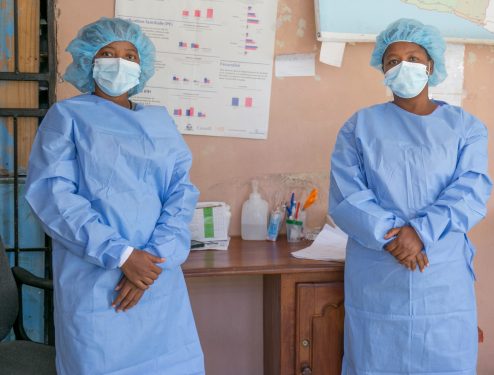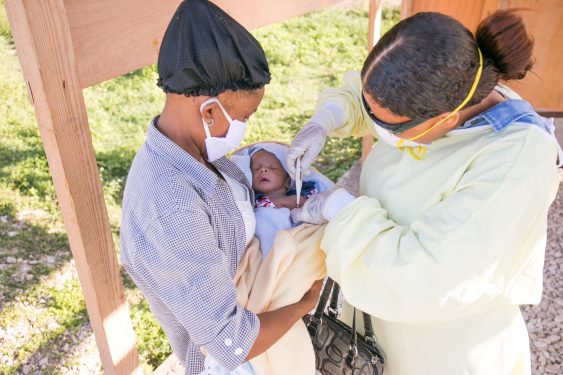
WINDSOR TERRACE — A long-awaited half-million doses of COVID-19 vaccine have been slow to reach the arms of Haitians this summer for several sensational reasons, the latest being the devastating 7.2-magnitude earthquake that struck on Aug. 14.
The quake has killed at least 2,200 people, left another 350 missing, and destroyed homes, churches, roads, bridges, hospitals, and clinics. Even before the quake hit, Haiti had been stunned by the assassination of its president in July and terrorized by an ongoing scourge of highway robbery perpetrated by armed street gangs.
Aside from the turmoil, many Haitians balked at receiving the vaccine — a consequence of lingering misinformation, said Dick Day, vice president of programs and volunteers for the Catholic Medical Mission Board (CMMB).
The Manhattan-based CMMB is working to assist Haiti’s health ministry’s plans to distribute the vaccine.
“So much misinformation and fears are fueling vaccine hesitancy,” Day said. “There are fears among young women that it will impact their fertility. There are some crazy ideas that the vaccine is actually about inserting a tracker into people’s arms.
“The ministry of health had begun a campaign, but that obviously came to a screeching halt with the earthquake. There really isn’t any vaccination in the southern part of the country in the short term.
“That’s not to say it’s not an imperative. But right now, the first emergency is really taking care of those who have been injured, and trying to get infrastructure back up and running, including primary health care centers and clinics in rural areas that were destroyed.”
Government missteps caused the first delay in vaccine distribution earlier this year when the Haitian government hesitated to take 130,000 doses of the AstraZeneca vaccine that had been made in India but initially weren’t needed there. At the time, Haitian officials were concerned about reports that in rare cases, the vaccine may cause blood clots.
When officials in Haiti finally decided to send for the doses, counterparts in India said the medicine could no longer be spared, because a catastrophic COVID-19 surge had struck there.
By the end of May, Haiti was experiencing its own uptick in COVID-19 cases. The nation’s supreme court chief justice, René Sylvestre, succumbed to the disease on June 23. With no vaccines, Haitian health officials worried they were about to see a devastating rush of cases like those that ravaged India.
Anxiety grew in early July as Haiti was plunged into more chaos with the assassination of President Jovenel Moïse.
“There is no doubt that it had an impact in slowing down the vaccination campaign,” Day said. “It was well over a week that Haiti was trying to figure out who was in charge of the government. So there was a lot of political jockeying. When that happens bureaucracies tend to slow down a little bit from their normal work.”
But the World Health Organization’s COVID-19 Vaccines Global Access program (COVAX) was still working to help Haiti. Within days of Moïse’s death, COVAX sent Haiti 500,000 doses of the Moderna vaccine that were donated by the United States.
“But of those 500,000, only about 25,000 of them, or 5%, have been utilized to date,” Day said. “The expiration of those doses, I believe, is November 2021. So they still have three months to get this going again.”

Meanwhile, Day said, the government is protecting the doses by keeping them in cold storage. Once the immediate needs of quake relief are largely fulfilled, focus can shift back to vaccine distribution.
At that point, health professionals and officials will have to move fast in order to hedge against possible super-spreader events that could result from quake refugees congregating for food and shelter.
To that end, CMMB is working with 125 Caritas-run clinics throughout the country, Day said.
“And those are the same communities in which we’re working with parish priests to help address vaccine hesitancy,” he added. “And we’re strengthening the ability of those little rural clinics to actually do the vaccinations themselves. We’re doing that with a provision of some cold boxes — the end part of the ‘cold chain.’ ”
Day said the 500,000 doses are an important start.
“But it’s a drop in the bucket,” he warned. “I think the big thing to do in the short term is to really demonstrate both demand for those vaccines that are already in the country, as well as the capacity to deliver them.
“We’ve got to really address the hesitancy issue in Haiti. I think once we do that, COVAX has made a much greater commitment than what they’ve delivered on to date. So I think there’s hope on the horizon.”
